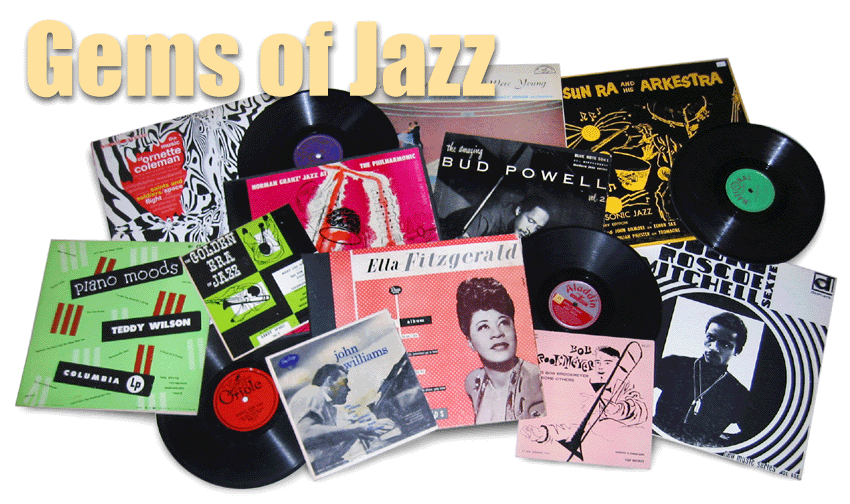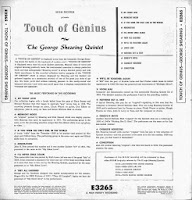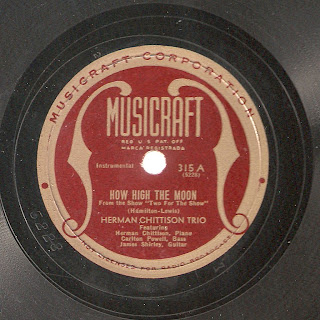
Over the last century, thousands of jazz recordings have assumed their rightful place as classics of the American musical canon. But just as many extraordinary sessions have fallen by the wayside. Gems of Jazz is dedicated to bringing some of those forgotten recordings to light, offering digital versions taken from the shellac and vinyl originals.
Saturday, September 28, 2013
12 by George
Call this a guilty-pleasure posting. I've always loved George Shearing's music, even though much of it is – in my unbiased opinion – pop schlock. His stuff on Capitol devolved into spurts of tidy piano interspersed between tedious string arrangements and woo-woo vocal choirs. I have about thirty of his recordings on that label and I never listen to those (how I got them is a long story). But I do listen to the sessions Shearing and the quintet did for MGM. They're something else altogether.
By the time George Shearing got to America from his native England in 1947, he was already considered an accomplished jazz pianist. He'd already recorded for Leonard Feather, and in 1949 his performance of "September in the Rain" on MGM sold nearly a million copies. Whether he got his "locked hands" style of soloing from Lionel Hampton's pianist, Milt Bucker, or whether he thought it up himself is beside the point. Shearing soon became associated with that distinctive sound, and his many, many records for MGM serve up numerous examples of it. They are formulaic, to be sure, with the melody invariably played in unison by piano, guitar and vibes, but the tight ensemble work, light touch and succinct virtuosity convey a kind of jazz urbanity that is unique in the music.
A George Shearing record and cocktails really do seem to go together.
So here's my favorite George Shearing album. It's one of five LPs he issued on MGM, culled mostly from his earlier 78 rpm releases. It's a comfortable mix of romantic pop ballads and bop-oriented originals. The personnel varies a bit, but it's mostly Don Elliott on vibes (also an accomplished mellophone and trumpet player) and Chuck Wayne on guitar. Give a listen, and I think you'll hear why King Pleasure immortalized Shearing in his lyrics to Lester Young's "Jumpin' with Symphony Sid."
As always, these files were dubbed directly from the vinyl with just a little cleaning of the sound. Sorry for the heavy ring wear on the cover, but I was too lazy to Photoshop it out. Note that the order of the tunes is incorrect on the cover but has been fixed below.
Touch of Genius
George Shearing Quintet
MGM E3265
George Shearing, p; Don Elliott, xyl, vbs; Chuck Wayne, g; John Levy, b; Denzil Best, d. New York, NY; February 5, 7, 1951
1. My Silent Love
2. Midnight Mood (Shearing)
3. If You Were the Only Girl in the World
4. Minoration (Johnny Pate)
Marjorie Hyams, vbs, replaces Elliott.
New York, NY; June 28, 1949
5. Nothing but D Best (Denzil Best)
Personnel as above.
New York, NY; July 5, 1950
6. Geneva's Move (Denzil Best)
Personnel, date as 1.
7. I'll Never Smile Again
Personnel as 1.
New York, NY; February 7, 1951
8. They All Laughed
Al McKibbon, b, replaces Levy.
New York, NY; May 16, 1951
9. We'll Be Together Again
Personnel as 1.
New York, NY; February 7, 1951
10. Loose Leaf
Personnel as 1, Marjorie Hyams, vbs, replaces Elliott.
New York, NY; December 12, 1949
11. Carnegie Horizons (Shearing)
Personnel as above.
New York, NY; July 27, 1949
12. Conception (Shearing)
Find it here: https://www.mediafire.com/?7mbp4vxm9fi8zcq
Monday, September 23, 2013
National Holiday
Happy birthday to John Coltrane, born 87 years ago on this date. The current administration in Washington, DC, has asked the management here at Gems of Jazz to announce that today has officially been declared a national holiday. Everybody is urged to stay home from work and play "Chasin' the Trane" from "Live at the Village Vanguard" as loud as possible!
File (un)Sharing
 |
| RapidShare: New and unimproved, right. |
Well gang, our pals at the dreaded RapidShare have once again morphed their service into something else, leaving all previous files that had been laboriously uploaded to their server in the unlinked digital dust. If you're interested, you can read a little about their current shenanigans here.
What this means for Gems users is simply this: None of the links on previous posts work. So the Board of Trustees here at Gems (namely, yours truly) has made an executive decision. Gems will relink the last dozen or so posts, so they should be available again soon. If you're interested in some of the older stuff, send us a request and we'll get you the link.
Sorry about all this, but when you use free services like Gems does you're at the mercy of those providing the service. Grrrr!
Update: Take courage, Gems users! All broken Rapidshare links have been repaired (I think). Those that were hosted by Mediafire remain with that file-sharing site. So you should be good to go – until the next time that these sites decide to mess with a good thing, that is.
Monday, September 9, 2013
Marzette the Obscure
Long-time visitors to this blog know that as a college student I worked in a Discount Records store in upstate New York. Those were the days when recorded jazz was in serious remission. The heyday of the great independent jazz labels (Blue Note, Prestige, Riverside) had passed and the majors were mostly focusing on mining the huge profits that could be made from "progressive" rock. Things were so bad that the Schwann Catalog listed only one Charlie Parker record in print. I kid you not.
 |
| Most record stores in the 1970s had vast quantities of cut-out records for sale, usually – as in this photo – at the back of the store. |
We also had the entire BYG Actuel series with Braxton, the AEC, Archie Shepp and Clifford Thornton. Being enamored of the avant garde, I was most interested in those and any other "outre" LPs in our melange of cut-outs. One record caught my eye because of its striking cover. There was only one copy in the bins and it was a bit worse for wear with torn shrink wrap and a partially split cover. It was entitled "Marzette."
We were allowed as Discount Records employees to open any record in the shop for in-store play.I had of cache of sides I liked to listen to while ringing out customers, and I added "Marzette" to them. From the liner notes, I gathered that Marzette Watts was a painter/film maker who also played tenor. He was evidently pals with Bill Dixon, a horn player and composer I knew from his association with Archie Shepp. The music was typical "free jazz" of the period, not terribly together and not very good. Watts was, in my twenty-something judgment, a fairly mediocre saxophonist. I would put the record on when I wanted to drive customers looking for the latest Allman Brothers or Carole King album out of the store.
Even though I didn't think much of "Marzette," I eventually bought if (for all of four bits, at the employee discount) and took it home. It's been on the shelf now for forty years, pretty much unlistened to since those college days. But not long ago I was tootling around the Interwebs and I came across a copy of "Marzette" that had sold at auction for $350. Surprise!
 |
| Ms. Waters in her ESP days. |
On relistening to "Marzette," I'm still not much impressed by Watts' playing or the record. But it does have a nice energy in places and Bobby Fews and J.C. Moses contribute much to whatever coherence the album has. Because it's so unaccountably sought after, I thought I'd post it here so that you Gems fans can decide for yourselves.
Mr. Watts, by the way, studied painting at the Sorbonne in Paris in the early sixties before hooking up with Clifford Thornton and recording his first LP for ESP in 1966. His painter's loft was a hangout for many on the avant garde's front line – Shepp, Don Cherry, Ornette, Cecil Taylor and Pharaoh Sanders among them. In 1968 he recorded "Marzette" for Savoy, at a time when the label had abandoned jazz almost completely and was concentrating on gospel music. As a result, the album sold only a handful of copies and was soon relegated to bargain bins. Like Bill Dixon, Watts later briefly taught at Weslyan in Middletown, CT, presumably in music. Watts eventually quit music altogether and concentrated on art and film making. He died on the West Coast in 1998.
So here's the Marzette Watts Ensemble as produced by Bill Dixon, in all its obscure glory. These files were taken right from the vinyl, of course, with no cleaning of the sound required. Gems has saved you a cool 350 clams!
Marzette
The Marzette Watts Ensemble
Marzette Watts, ts; George Turner, cnt; Marty Cook, tbn; Frank Kipers, vln; Robert Fews, p; Juny Booth, Steve Tintweiss, Cevera Jehers, b; Tom Berge, J.C. Moses, d; Amy Shaeffer, Patty Waters, v. Bill Dixon, prod.
New York, NY; 1968; Savoy MG-12193
1. octobersong (Dixon)
2. Play It Straight (Coleman)
3. F.L.O.A.R.S.S. ((Watts)
4. Medley (Watts)
5. Lonely Woman (Coleman)
6. Joudpoo (Watts)
Find it here: https://www.mediafire.com/?0y4z5i6ddu6j6ci
Tuesday, September 3, 2013
88s on 78
Old technology tends to pile up around the Gems household. Particularly when the venerable technology is in the form of shellac platters. I've been meaning to upload dubs of some of Gems' hundreds of 78-rpm recordings for a while, and finally some spare time has arrived with the end of summer. So here's hodgepodge of interesting stuff, some of it extremely rare, some available on compilations, but all of it great jazz of the pianistic variety.
Leading off the program is Hazel Meyers, a little-known singer who had a career primarily on the Vaudeville stage. But here she sings some topical blues in a convincing manner, with the great Fletcher Henderson accompanying. Of special interest on these performances are the excellent muted cornet fills by the legendary Joe Smith, a musician whose work with Bessie Smith we all know.
There's also Duke Ellington and the boys doing "St. Louis Blues" on a 12-inch Columbia disc. Nothing too unusual about that, except that the vocalist is a crooner named Bing Crosby. I had no idea the Duke and Bing ever got together, but here's the evidence (and Bing scats a chorus just to prove he's no square as the piece closes).
Clarence Profit was a New York swing pianist who spent some time in the Caribbean. He's all but unknown today, but in the '30s and early '40s he was thought of in the same class as Teddy Wilson. He recorded this date for Decca in 1940, four years before his death at age 32.
The Joe Bushkin date features a young Zoot Sims on tenor. If you're a drinker, don't miss Johnny Gaurnieri's "Hangover" – it'll give you a hangover just listening. Herman Chittison was another talented swing player who fell through the historical cracks. He recorded a number of well-received 10-inch albums for Columbia in the '50s, but this is one of his earliest dates. Continuing with obscure pianists, Cyril Haynes was completely unknown to me when I came upon his Comet recording. He worked mostly in New York and was with the Savoy Sultans for a time, but here he's joined by Dick Vance from Andy Kirk's band and the great Don Byas.
Pat Flowers was a Fats Waller devotee, even recruiting some of Fats' original band members after Waller passed. Flowers is usually dismissed as an imitator, but he sounds good to me on this Majestic date. Hazel Scott reprises her spot in the movie "Rhapsody in Blue" with a bit of nice piano and a stiffish vocal on a Gershwin classic (the movie was about George's rise to fame).
Avery Parrish, Erskine Hawkins' pianist, revisits his hit "After Hours" on a Dud Bascomb selection (Bascomb was also in the Hawkins band), and we get to hear Earl Hines leading a thoroughly modern-sounding big band on a rare ARA recording. Erroll Garner plays his inimitable style on a couple of tunes on the virtually unknown Acorn label.
Count Basie's up next with a couple of sides done for Norman Granz. These have been reissued, but I've included them because they're so tasty I couldn't resist. Finally, it's the Lion with a blues and a chestnut, swinging hard in post-stride fashion. His is the only record I've ever seen on the Blue Circle label.
Speaking of labels, here's a sampling:
As always, these files were dubbed from the originals with just a minimum of cleaning and editing. So be prepared for surface hiss and slight pops and clicks. If you can tolerate that, I think you'll really enjoy these long-lost treasures.
Piano Rareties, 1923-1953
Various artists, labels
Hazel Meyers, v; Fletcher Henderson, p; Joe Smith, cornet.
New York, NY; October 30, 1923; Vocalion 14709
1. Awful Moanin' Blues
2. He's Never Gonna Throw Me Down
Duke Ellington Orchestra w/Whetsol, Williams, Nanton, Tizol, Brown, Bigard, Hodges, Guy, Braud, Greer, plus Bing Crosby, v.
New York, NY; February 11, 1932; Columbia 55003
3. St. Louis Blues
Clarence Profit, p; Jimmy Shirley, g; Ben Brown, d.
New York, NY; September 11, 1940; Decca 8527
4. Dark Eyes
5. Azure
Joe Bushkin, p; Ernie Figueroa, tp, Bill Harris, tbn; Jack Sims, ts; Sid Weiss, b; Specs Powell, d.
New York, NY; May 1944; Commodore 511
6. Oh, Lady Be Good
7. Fade Out
Johnny Guarnieri, p; Slam Stewart, b; Sammy Weiss, d.
New York, NY; November 7, 1944; Savoy 554, 555
8. Firebird (Guarnieri)
9. Hangover (Big Head) (Guarnieri)
10. That Old Black Magic
11. I'm in the Mood for Love
Herman Chittison, p; Jimmy Shirley, g; Carlton Powell, b.
New York, NY; December 8, 1944; Musicraft 315
12. How High the Moon
13. The Song Is Ended
Cyril Haynes, p; Dick Vance, tp; Don Byas, ts; Al Casey, g; John Levy, b; Harold West, d.
New York, NY; 1944; Comet T5
14. Across the Road (Haynes)
15. Cedar Manor (Haynes)
Pat Flowers, p; unknown b, d.
New York, NY; late 1940s (?); Majestic 1010
16. Ain't Misbehavin'
17. Original Blues (Flowers)
Hazel Scott, p, v; orchestra cond. by Toots Camarata, from Warner Bros. movie "Rhapsody in Blue"
New York, NY; May 3, 1945; Decca 23429
18. Fascinating Rhythm
Avery Parrish, p; Dud Bascomb, tp; Paul Bascomb, ts; Tiny Grimes, g; John Simmons, b; Sid Catlett, d.
New York, NY; 1946; Alert 102
19. After Hours
Earl Hines, p; orchestra including Benny Green, Scoops Carey, Wardell Gray, Kermit Scott
Los Angeles, CA; April 1946; ARA 156
20. Straight Life
Erroll Garner, p; Pat Simmons, b; Alvin Stoller, d.
Los Angeles, CA; March 29, 1949; Acorn 305
21. I Want a Little Girl
22. This Can't Be Love
Count Basie, org; Joe Newman, tp; Paul Quinichette, ts; Freddy Green, g; Gene Ramey, b; Buddy Rich, d.
New York, NY; December 13, 1952; Clef 89102
23. KC Blues
24. Stan Shorthair
Willie "The Lion" Smith, p; Harry Goodwin, tp; Jimmy Archey, tbn; Cecil Scott, ts; Pops Foster, b; William Purnell, d; Myra Johnson, v.
New York, NY; August 15, 1953; Blue Circle 500
25. When the Saints Go Marching In
26. The Lion Steps Out
Find it here: https://www.mediafire.com/?cb8clc1bu48q7ze
Subscribe to:
Comments (Atom)













